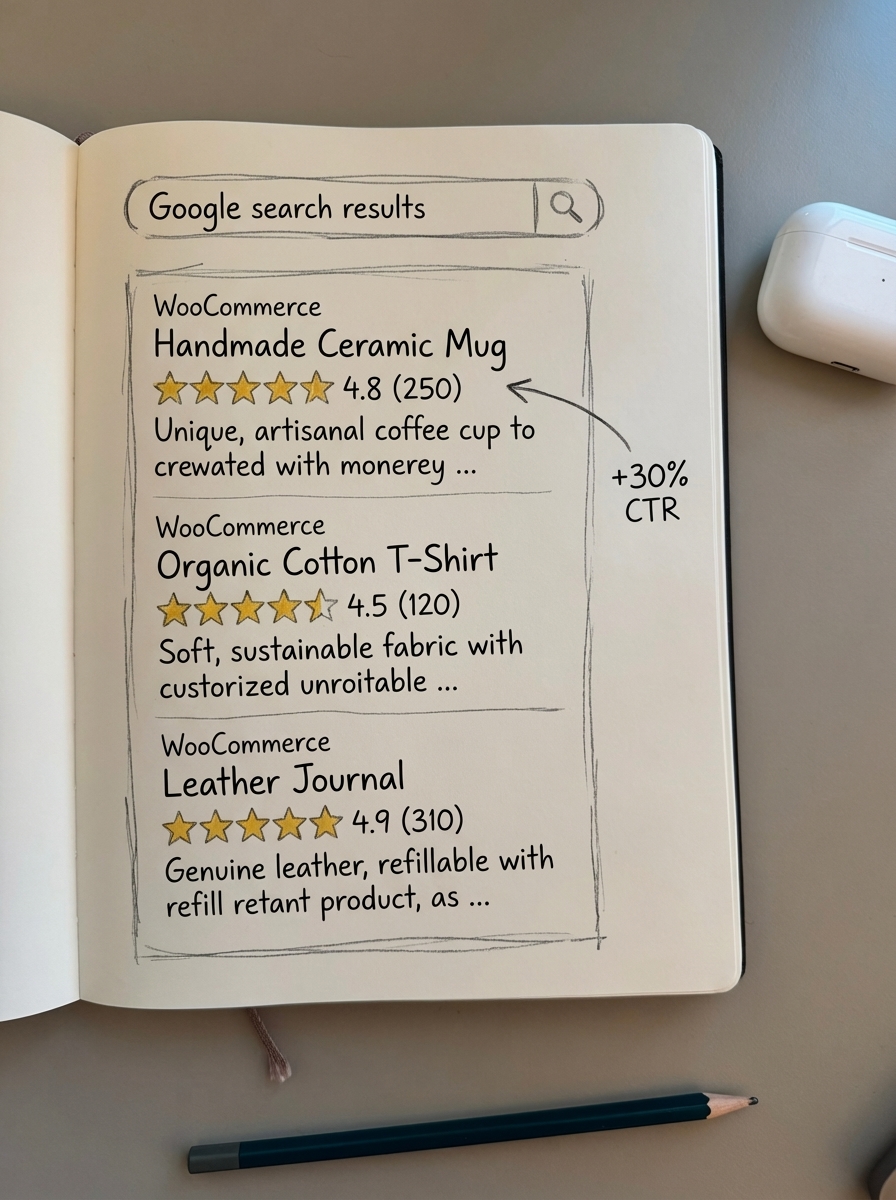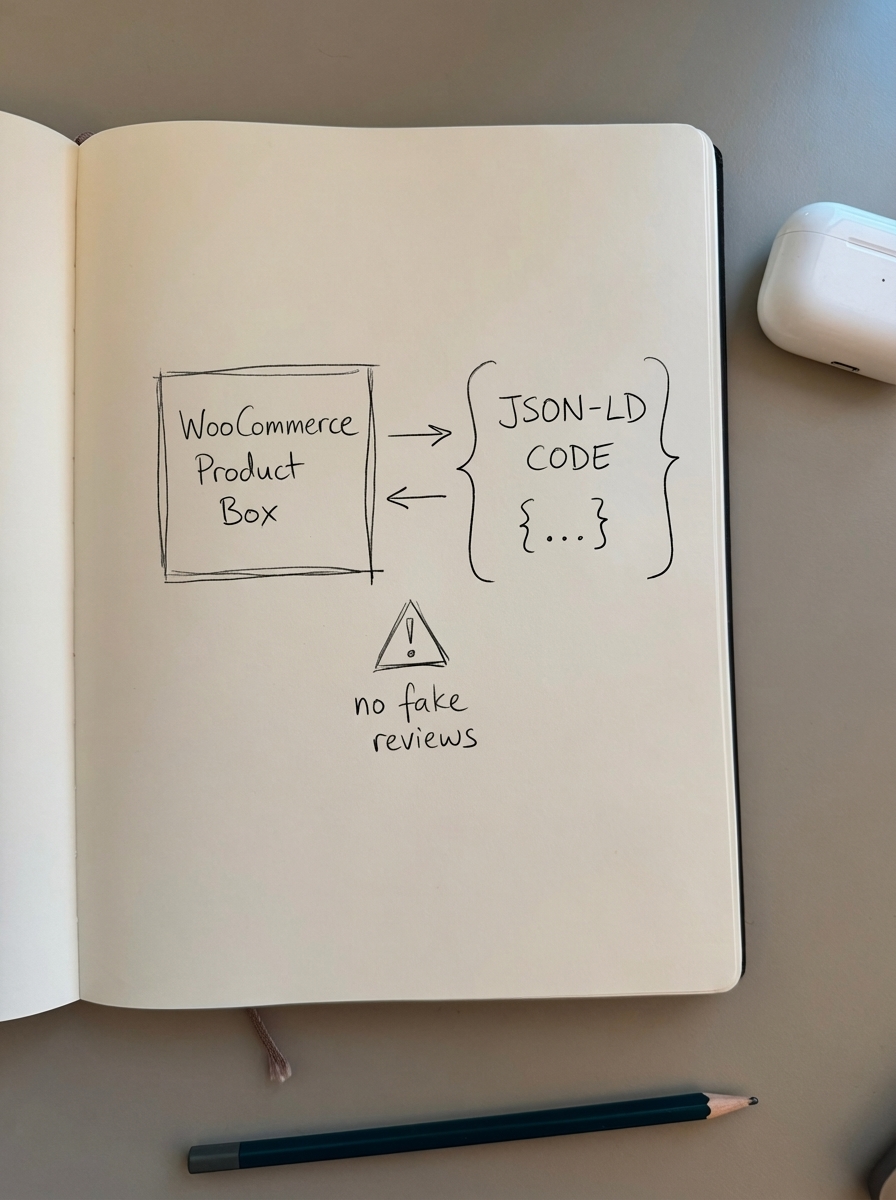WooCommerce reviews schema: Add star ratings to Google results
Product schema with visible reviews generates rich snippets showing star ratings, increasing CTR by 25-40%. The catch: WooCommerce’s default markup won’t get you there, and Google will penalize fake or hidden reviews.
Why review schema matters for WooCommerce stores
I’ve watched star ratings transform product page performance. One merchant saw CTR jump from 2.1% to 3.4% after fixing their review schema – that’s 62% more clicks to the same pages.

The mechanism is simple: when you implement proper Schema.org markup for product reviews, Google can display star ratings directly in search results. Users see social proof before clicking, which both increases click-through rates and pre-qualifies traffic.
Product schema must reflect visible page content. Google’s policy is explicit: hidden markup violates guidelines. If your page shows 4.5 stars with 37 reviews, your schema must reflect exactly those numbers. Discrepancies get you ignored or penalized.
The bigger challenge: WooCommerce’s built-in structured data uses outdated microdata format. Google strongly prefers JSON-LD, and most default WooCommerce themes don’t output the review schema properly. You’ll need to implement it yourself or use a dedicated plugin.
Requirements for valid review schema
AggregateRating requires visible user reviews on the page. You cannot show star ratings in search results without actual customer reviews displayed. Self-serving testimonials or incentivized reviews are prohibited.
Minimum required properties for compliant Product schema with reviews:
- Unique product identifier (SKU preferred, max 50 characters)
- Product name and description
- Product image URL
- Valid Offer markup with current price and availability
- AggregateRating with both
ratingValueandreviewCount - Individual Review objects for each review (author, date, text, rating)
AggregateRating must include both ratingValue and reviewCount; values must match visible page content. If you show 23 reviews on the page but your schema says 25, Google rejects the markup. This commonly happens when you count pending reviews or include reviews from external platforms that don’t appear on your product page.
The availability value must use full Schema.org URLs: https://schema.org/InStock, https://schema.org/OutOfStock, or https://schema.org/PreOrder. Not just “InStock” or “in stock.”
Implementation options for WooCommerce
Use an SEO plugin (recommended for most merchants)
For most WooCommerce stores, a dedicated SEO plugin is the fastest path to compliant review schema.
Rank Math (free version includes WooCommerce support) automatically generates JSON-LD for product reviews, handles AggregateRating when WooCommerce reviews are enabled, and is documented to handle 20,000+ products without performance issues. Validate output in the Rich Results Test after enabling.
Yoast WooCommerce SEO (premium) generates compliant product schema including reviews and syncs with WooCommerce’s native review system. Performance can degrade above 5,000 products; monitor admin load times.
AIOSEO (Pro version) provides dynamic schema templates for WooCommerce and handles catalogs up to 50,000 products with adequate server resources. Review count and rating values sync automatically with WooCommerce.
All three plugins output JSON-LD, which is Google’s preferred structured data format. For broader context on structured data implementation strategy, see our guide on WooCommerce structured data.

Custom JSON-LD implementation
If you need precise control or have a custom review system, implement JSON-LD directly. Here’s the complete structure:
{ "@context": "https://schema.org", "@type": "Product", "name": "Wireless Bluetooth Headphones", "image": "https://example.com/headphones.jpg", "description": "Premium noise-cancelling wireless headphones", "sku": "WBH-2024-BLK", "offers": { "@type": "Offer", "price": "89.99", "priceCurrency": "USD", "availability": "https://schema.org/InStock", "url": "https://example.com/product/wireless-headphones" }, "aggregateRating": { "@type": "AggregateRating", "ratingValue": "4.5", "reviewCount": "37", "bestRating": "5", "worstRating": "1" }, "review": [ { "@type": "Review", "author": { "@type": "Person", "name": "Sarah Johnson" }, "datePublished": "2024-01-15", "reviewBody": "Amazing sound quality and battery life.", "reviewRating": { "@type": "Rating", "ratingValue": "5", "bestRating": "5" } } ]}Output this JSON-LD in the <head> section or immediately after the opening <body> tag. Each review object must include author, date, review text, and rating. Don’t include reviews with no rating value – Google ignores them and they dilute your aggregate score.
The price in Offer markup must match the visible displayed price exactly. For variable products, use the lowest price variant or implement multiple Offer objects.
Hook into WooCommerce programmatically
For developers building custom solutions, this function outputs dynamic review schema per product:
function add_product_review_schema() { if ( ! is_product() ) { return; }
global $product;
// Only output if product has reviews if ( $product->get_review_count() === 0 ) { return; }
$schema = array( '@context' => 'https://schema.org', '@type' => 'Product', 'name' => $product->get_name(), 'sku' => $product->get_sku(), 'description' => wp_strip_all_tags( $product->get_short_description() ), 'image' => wp_get_attachment_url( $product->get_image_id() ), 'offers' => array( '@type' => 'Offer', 'price' => $product->get_price(), 'priceCurrency' => get_woocommerce_currency(), 'availability' => $product->is_in_stock() ? 'https://schema.org/InStock' : 'https://schema.org/OutOfStock', 'url' => get_permalink( $product->get_id() ), ), 'aggregateRating' => array( '@type' => 'AggregateRating', 'ratingValue' => $product->get_average_rating(), 'reviewCount' => $product->get_review_count(), 'bestRating' => '5', 'worstRating' => '1', ), );
// Add individual reviews $reviews = get_comments( array( 'post_id' => $product->get_id(), 'status' => 'approve', 'type' => 'review', 'number' => 10, // Limit to most recent 10 ) );
$review_schema = array(); foreach ( $reviews as $review ) { $rating = get_comment_meta( $review->comment_ID, 'rating', true ); if ( empty( $rating ) ) { continue; }
$review_schema[] = array( '@type' => 'Review', 'author' => array( '@type' => 'Person', 'name' => $review->comment_author, ), 'datePublished' => date( 'Y-m-d', strtotime( $review->comment_date ) ), 'reviewBody' => $review->comment_content, 'reviewRating' => array( '@type' => 'Rating', 'ratingValue' => $rating, 'bestRating' => '5', ), ); }
if ( ! empty( $review_schema ) ) { $schema['review'] = $review_schema; }
echo '<script type="application/ld+json">' . wp_json_encode( $schema, JSON_UNESCAPED_SLASHES | JSON_PRETTY_PRINT ) . '</script>';}add_action( 'wp_head', 'add_product_review_schema', 5 );This approach gives complete control over which reviews to include and how to format the output. The key: only include approved reviews ('status' => 'approve') and skip reviews without ratings. I’ve limited this example to the 10 most recent reviews because including hundreds of reviews in your schema adds page weight with diminishing SEO benefit.
Common review schema errors and fixes
”Missing field ‘review’ or ‘aggregateRating’”
This error appears when you include AggregateRating markup without any actual reviews on the page. The fix is straightforward: only output review schema on products that have approved reviews. Use $product->get_review_count() > 0 conditional logic before adding the schema block.
Don’t output empty review arrays or AggregateRating objects with zero reviews. Google requires at least one review for the markup to be valid.
”Value provided for offers.availability must be a valid URL”
The availability value must use the complete Schema.org URL format, not a string or partial path. Use https://schema.org/InStock, https://schema.org/OutOfStock, or https://schema.org/PreOrder.
Not “InStock”, “in stock”, or “in_stock”. The full URL is required.
Duplicate schema errors
When multiple plugins or custom code output product schema, Google sees conflicting data and rejects all of it. View your page source and search for "@type": "Product". If you find multiple instances, you have duplicate schema.
The fix: disable all but one implementation. If you’re using a plugin and have custom code, disable the custom code. If you have multiple plugins, keep only one active. For debugging approach and additional technical SEO considerations, see WooCommerce product page SEO.
Review count mismatch between visible page and schema
If your visible page shows 37 reviews but your schema says 35, Google rejects the markup. This commonly happens when comments awaiting moderation are counted in the visible display, deleted reviews aren’t removed from cached counts, or custom review systems don’t sync with schema output.
Use $product->get_review_count() to get the approved review count and ensure your visible page displays exactly the same number. Clear all caches after fixing the mismatch.
Star ratings not appearing in search results
After implementing valid schema, star ratings typically appear within 2-4 weeks. If they don’t appear after that window, validate your implementation:
First, validate markup using the Rich Results Test. This shows exactly what Google sees and confirms rich result eligibility.
Second, check Google Search Console under Enhancements → Product for errors. Google reports specific issues preventing rich results.
Third, verify reviews are visible on the page and not hidden behind JavaScript that requires user interaction to display. Google must be able to see the reviews in the rendered HTML.
Fourth, confirm you have enough reviews. While Google doesn’t publish a minimum threshold, I’ve observed that products with fewer than 5 reviews rarely display star ratings even with valid schema.
Fifth, ensure the product page is indexed. Check site:yourdomain.com/product/product-name in Google. If the page isn’t indexed, star ratings won’t appear regardless of schema validity.
Automating review schema at scale
For stores with hundreds or thousands of products, manually maintaining review schema is impractical. Every new review requires schema updates, and multiplied across a large catalog, this becomes a significant maintenance burden.
ContentGecko automates this through direct catalog synchronization. When integrated with your WooCommerce store, it generates proper Product and AggregateRating schema for all catalog-aware content, updates review counts and ratings when new reviews are posted, maintains schema accuracy across supporting blog content that references products, and creates proper structured data relationships between informational content and product pages.
This matters most for enterprise catalogs where products frequently gain new reviews. Manual schema maintenance would require constant monitoring and updates. Automation ensures accuracy without ongoing manual intervention.
The broader benefit: as AI-generated answers have seen traffic growth of 1,200% between July 2024 and February 2025, properly structured review data becomes increasingly important. LLMs rely heavily on structured data to understand and surface product information in AI search results.
For comprehensive structured data strategy beyond just reviews, see our complete guide to WooCommerce structured data.
Beyond product reviews: Maximizing structured data
Review schema is one component of a complete structured data strategy. To maximize search visibility, combine multiple schema types.
FAQ schema on product pages captures additional SERP real estate. I’ve implemented this for product pages that answer common questions in expandable sections. Google shows both star ratings and FAQ dropdowns in search results, significantly increasing the visual footprint of your listing.
BreadcrumbList schema signals site architecture to Google and helps reviews perform better by establishing clear category hierarchy. Google understands how products relate to categories and subcategories, which strengthens topical relevance signals. Implementation details in our WooCommerce breadcrumbs SEO guide.
VideoObject schema for product demonstration videos creates extremely clickable listings when combined with star ratings. The combination of social proof (reviews) and visual content (video thumbnails) in search results outperforms either element alone.
HowTo schema on supporting content that references reviewed products connects informational content to transactional pages through structured data relationships. This helps Google understand content hierarchy across your site.
The combination of these schema types, properly connected through your content and product catalog, significantly outperforms isolated review markup. Product, FAQ, and review schema implementation improves LLM understanding of content structure and helps AI systems quickly identify and extract relevant information for AI-powered search results.
As traditional search evolves toward AI-mediated experiences, this comprehensive structured data approach becomes increasingly critical. For broader context on AI optimization, see AI for WooCommerce SEO.
Validating and monitoring review schema
Validation must happen immediately after implementation and continuously thereafter.
Google Rich Results Test shows exactly what Google sees and which rich result types you’re eligible for. Paste your product URL or raw HTML. Test edge cases: products with one review, products with 5+ reviews, products with no reviews, products on sale, and out-of-stock products. Each scenario should handle schema appropriately.
Schema Markup Validator at validator.schema.org verifies your JSON-LD follows Schema.org specifications. This catches technical errors that might not prevent rich results immediately but could cause issues as Google updates its algorithms.
Google Search Console Product rich results report under Enhancements shows how many products have valid review schema, errors preventing rich results, and impressions and clicks specifically for rich results versus standard results. This data quantifies the impact of your review schema implementation.
Set up weekly monitoring of the Product report. A sudden drop in valid items usually indicates a plugin update that broke schema output, a theme change that removed review markup, or a caching issue that’s serving stale schema.
For large catalogs, automated monitoring is essential. ContentGecko continuously checks schema validity and automatically fixes common issues when catalog data changes – price updates, inventory changes, new reviews, or product modifications. This prevents the schema drift that commonly occurs in large WooCommerce stores where manual monitoring is impractical.
The monitoring payoff: catching schema errors early prevents loss of rich results that directly impact traffic and revenue.
Measuring review schema ROI
Track specific metrics to quantify the impact of review schema implementation.

CTR for products with versus without reviews: Filter Google Search Console by product pages and segment by review count. Compare CTR for products displaying star ratings versus products without them. Products with star ratings typically show 25-40% higher CTR than identical products without visible ratings in search results.
Organic traffic to product pages: Compare pre-implementation and post-implementation traffic trends for products that gained star rating display. Use Google Analytics with a date comparison that isolates the implementation period. Factor in seasonality and other ranking changes.
Conversion rate from organic search: Products appearing with star ratings often convert better because star ratings pre-qualify visitors. Users who click through knowing the product has strong reviews are further along the buying journey than users who click a listing without social proof signals.
Rich result impressions: Search Console reports impressions specifically for rich results. Track the percentage of your product impressions that include enhanced features. As this percentage grows, monitor corresponding CTR increases.
The compound effect matters more than individual metrics. Higher CTR generates more traffic, which produces more sales and more reviews, which strengthens rich results, which increases CTR further. This flywheel effect is why review schema ROI compounds over time rather than remaining static.
I’ve watched this play out with clients: initial CTR lift of 30% leads to 15% more sales over three months, which generates 20% more reviews, which improves average rating from 4.2 to 4.4 stars, which drives another 10% CTR increase. The second-order effects exceed the direct impact.
TL;DR
Valid review schema for WooCommerce requires visible customer reviews, exact AggregateRating markup matching displayed review counts, and individual Review objects in JSON-LD format. Implement via SEO plugins like Rank Math for quick deployment, or build custom JSON-LD for precise control. Validate with Google Rich Results Test and monitor Search Console’s Product report continuously. For catalogs above 1,000 products, automation through tools like ContentGecko prevents the maintenance burden of keeping review schema accurate as products gain new reviews. Properly implemented review schema typically increases CTR by 25-40% and creates a compounding effect as higher traffic generates more reviews, strengthening rich results over time.
